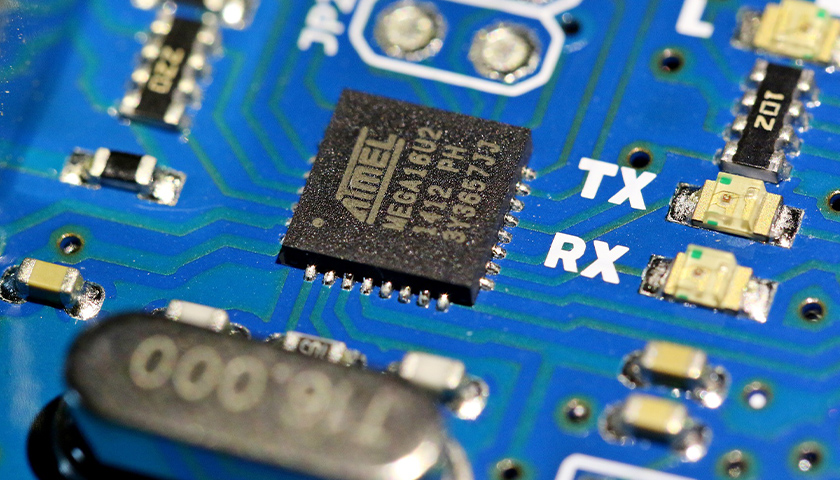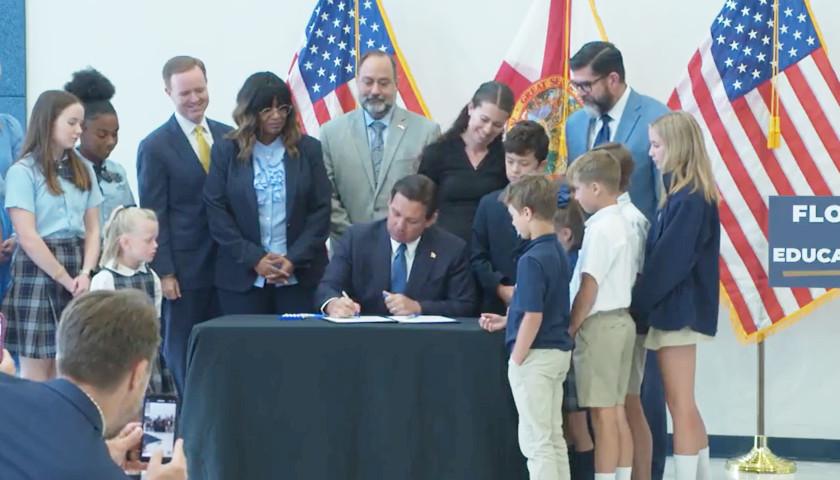by Bethany Blankley
With chip and semiconductor shortages expected to last through the year, Gov. Ron DeSantis said Florida is continuing its investment in local technology initiatives to strengthen the economy and job growth and eventually offset future production delays.
Osceola County and Valencia College received nearly $10 million in funding through the Florida Job Growth Grant Fund to support semiconductor and other advanced technology manufacturing in the county.
The award includes $6 million to assist with developing infrastructure connecting the county’s emerging NeoCity technology district with its workforce, and $3.7 million to Valencia College to develop a new program that will train students in utilizing robotics technology for semiconductor manufacturing. The two awards are designed to help create manufacturing jobs and develop a talent pipeline to support industry growth.
NeoCity, an up-and-coming world epicenter for smart sensors, photonics and optics, has ready-made synergies with the University of Central Florida (the nation’s largest producer of aerospace engineers), and four other universities, as well as Central Florida’s large concentration of Department of Defense partners and contractors, according to its website. It’s poised to serve as a catalyst for high-tech innovation and creation, including jobs and capital investment, and is already generating marketplace momentum, and research, development and commercialization hubs in locally planned communities.
“Expanding domestic manufacturing capability is important for Florida and our nation,” Gov. DeSantis said. “The strategic investments we are making today will help bring microchip and semiconductor manufacturing back to our state at a time when the supply chains are more fragile than ever. Certainly, we cannot allow this important industry to become captive by the Chinese Communist Party.”
Osceola County was previously awarded $5.8 million through the Florida Job Growth Grant Fund for the construction of primary northern gateways and a main thoroughfare for NeoCity. The $6 million adds to the initial investment with planned improvements for the southern gateway, called NeoVation Way. The expansion includes constructing a 3,160 linear-foot, two-lane roadway with a gateway design feature, on-street parking, a multi-use path, sidewalks, landscaping, and lighting.
The $3.7 million in funding for Valencia College will address workforce development needs related to incorporating robotics technology into the manufacturing and distribution industry sectors through the Accelerated Skills Training Program in Robotics Technology. The workforce program includes a specialized semiconductor track designed to prepare future robotics technicians for the semiconductor industry and an Advanced Robotics Learning Factory involving partnerships among Central Florida businesses and the college.
“Strategic investments in emerging industry sectors, like what is happening at NeoCity, and critical industries, such as chip and semiconductor manufacturing, will continue to elevate Florida’s future economic growth,” Dane Eagle, secretary of the Florida Department of Economic Opportunity, said.
Any type of technology that is computerized depends on semiconductors to function. Currently, a worldwide semiconductor shortage is due to a combination of factors related to supply and demand.
During the state shutdowns last year, more people bought computers, smartphones and electronic devices that caused a rise in demand for chips to be built for the tech industry. While demand went up for chips, supply went down, as it normally would, but was also impacted by weather conditions outside of the industry’s control.
A major chip supplier in Japan had a fire, halting chip production. Texas-based Intel experienced issues related to the mid-February freeze and months later restructured its operations after announcing delays in its 7nm processers, ZDNet reported. And Tawain, one of the largest chip producers in the world, experienced a drought that impacted chip production, which requires a lot of water.
Last fall, the global consulting firm AlixPartners warned of major disruptions to the auto industry due to ongoing semiconductor shortages. Lack of chips were “just one of a multitude of extraordinary disruptions the industry is facing – including everything from resin and steel shortages to labor shortages,” Mark Wakefield, global co-leader of the automotive and industrial practice at AlixPartners said.
However, some companies already began planning to invest in American manufacturing, understanding the need to shift reliance from overseas production. In November, Texas Instruments Incorporated announced it was investing $30 billion in the construction of 300-mm semiconductor wafer fabrication plants in Sherman, Texas.
“In addition to bringing billions of dollars in capital investment and thousands of new jobs to North Texas,” Texas Instrument’s historic investment “will keep Texas a national leader in semiconductor manufacturing while also strengthening the domestic semiconductor supply chain,” Texas Gov. Greg Abbott said.
– – –
Bethany Blankley contributes to The Center Square.








